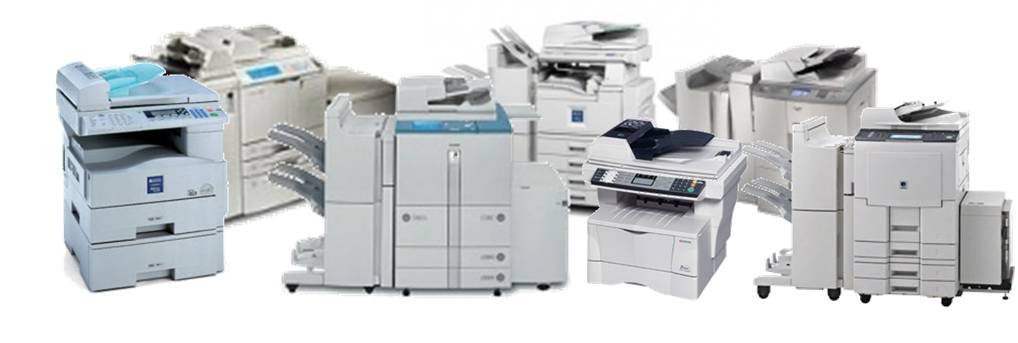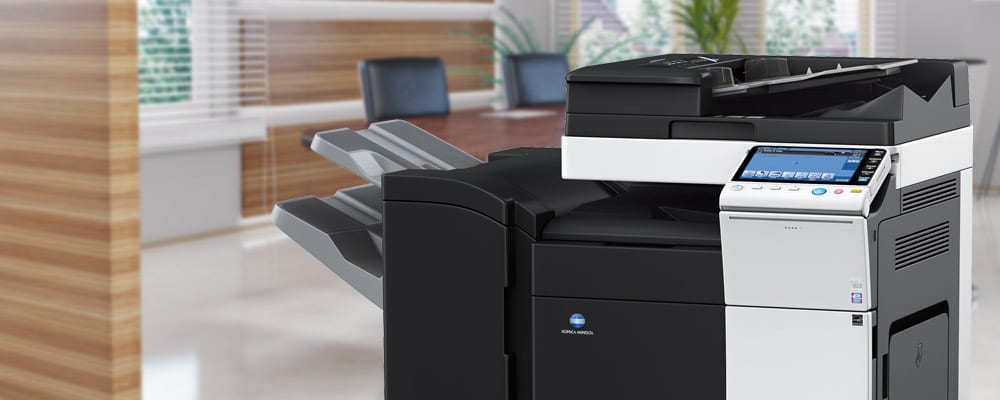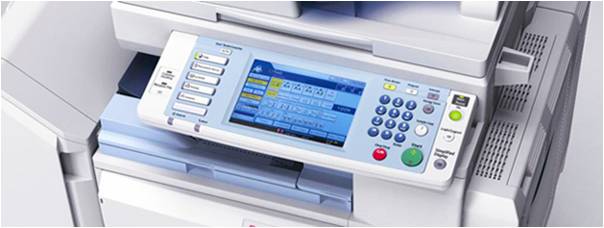
———– Office Copiers / Printer, Buying Advice ———–
A Guide For Buying Office Copy Machines
Commercial copiers are a big investment for your business, and there’s a lot of information to sift through when you’re considering a purchase or an upgrade to the newest technology.
The first step in finding a digital commercial copier that will suit your business needs is to figure out what exactly you need it to do and how much use it will be getting. From there, you can easily narrow your options down further based on specific features, cost, security, and more. This guide will help you understand what goes into buying a commercial copier for your business so you can get the best photocopier for all your business copying needs to be taken care of quickly, cost-effectively, and without any jams!

Determining What You Need From Your Copier
These days, digital copiers can do a lot more than simply make copies. They can also print, sort, scan, fax, network, and more. Whether you work from a home office or are part of a large corporation, there is a digital copier out there that can meet all of your needs.
- For low volume printing (less than 1,000 copies per month):
- A high-end commercial copier is not necessary.
- Opt for a small business copier as a cost-effective choice.
- For high volume printing or specific advanced features:
- A true commercial copier is valuable.
- The added upfront cost is justified by its capabilities.

The features available on different commercial copiers vary substantially. Virtually all modern multifunctional printers (MFPs) can copy, print, scan, and fax, but there are also many other optional functions available in photocopiers. Features like sorting, double-sided printing, hole punching, stapling, and large-format printing are smart choices for large offices because they can save both time and space in your busy office, and save money on external printing costs for special projects.
Keeping Your Copier Connected and Secure
Security and networking features are also becoming highly important in today’s wireless world. Many commercial copiers can be set not to operate or allow access until a passcode had been entered, which adds significant protection.
- Security Code Requirement:
- High-tech copiers allow for mandatory entry of a security code by all staff and personnel.
- Ensures authorized usage and safeguards private or confidential documents from unauthorized access.
- Internal Memory Storage:
- Networked copiers store thousands of pages in internal memory, awaiting print commands.
- Enhances document security and prevents unauthorized viewing of documents in the output tray.
- Usage Tracking and Analysis:
- Network connectivity enables tracking and analysis of copier usage.
- Allows for monitoring and assessment of print and copy usage, either overall or by department.

Where Should I Buy My Commercial Copier?
Choosing the Right Source for Office Copiers: A Guide for Businesses:
In the era of digitalization, office copiers remain an indispensable tool for businesses of all sizes. From small startups to large corporations, the need for reliable and efficient copying solutions is universal. However, determining where to purchase these vital machines can be a daunting task. This guide aims to simplify this process, ensuring businesses make an informed decision that aligns with their needs and budget.
1. Authorized Dealers
Authorized dealers are often the first choice for many businesses. These dealers are directly linked with copier manufacturers and offer a range of products from basic models to advanced multifunction devices. The benefits of purchasing from an authorized dealer include:
- Access to the Latest Models: They provide the newest models with the latest technology.
- Professional Advice: Sales representatives are typically well-trained to guide you towards a copier that best suits your business’s specific requirements.
- After-Sales Service: They often provide comprehensive service agreements, including maintenance and repair services, which can be crucial for minimizing downtime.
2. Online Retailers
The rise of e-commerce has made online retailers a popular choice for buying office copiers. Platforms like Amazon, Best Buy, or direct online stores of major copier brands offer a wide selection with competitive pricing. Key advantages include:
- Convenience: Shopping online allows for easy comparison of different models and prices.
- Reviews and Ratings: Customer reviews can provide valuable insights into the performance and reliability of various copiers.
- Attractive Deals: Online retailers often offer discounts, especially during holiday seasons or special sales events.
3. Office Supply Stores
Stores like Staples or Office Depot are readily accessible and provide the opportunity to see the copiers in person. Their advantages are:
- Immediate Availability: You can purchase and receive a copier on the same day.
- Personal Interaction: The chance to ask questions and get immediate responses from sales staff.
- Supplementary Products: Easy access to additional office supplies and accessories.
4. Leasing Companies
Leasing is an excellent option for businesses not wanting to invest in purchasing a copier outright. It’s particularly beneficial for startups or businesses with fluctuating copying needs. Leasing companies offer:
- Flexible Contracts: Options to upgrade or change equipment as your business needs evolve.
- Maintenance and Support: Most leases include maintenance plans, reducing the worry about upkeep.
- Cash Flow Management: It helps in managing cash flow by avoiding a large upfront payment.
5. Used or Refurbished Equipment Vendors
For businesses on a tight budget, purchasing used or refurbished copiers can be a viable option. These vendors often provide machines that are in good condition at a fraction of the cost of new ones. However, it’s crucial to thoroughly check the condition and warranty terms before purchasing.
Wired or wireless Connections
Wired Copiers: Wired copiers connect directly to a network or a computer via Ethernet cables. The primary advantage of this traditional setup is reliability. Wired connections are typically more stable, offering consistent speeds and fewer interruptions due to signal loss or interference. This makes them ideal for environments where large volumes of printing are common and network stability is crucial. Moreover, wired connections can offer faster data transfer rates, which is essential when dealing with high-resolution printing or large document files.
Wireless Copiers: Wireless copiers, on the other hand, connect to networks via Wi-Fi. This provides greater flexibility and convenience, as these copiers can be placed anywhere within the Wi-Fi range, eliminating the need for physical cabling. This flexibility is particularly beneficial in dynamic office environments or in spaces where running cables is impractical. Additionally, wireless copiers often support mobile printing, allowing users to print from smartphones or tablets. This enhances productivity and accommodates the increasing mobility of the modern workforce. However, wireless connections may be more susceptible to connectivity issues and can have slower data transfer rates compared to wired connections.
The choice between wired and wireless copiers depends on the specific needs of a business. Wired copiers offer stability and speed, making them suitable for high-volume, high-speed printing tasks. Wireless copiers provide flexibility and support for mobile devices, catering to modern, dynamic work environments. The decision should be based on the specific printing demands, office layout, and workflow requirements of the business.
Leasing a Commercial Copier Can Be a Smart Choice
Because commercial copiers are extremely expensive to buy and maintain, many business owners choose to lease a copier from a reputable copier leasing service. This may be a good option for smaller businesses that don’t have as much capital to invest in purchasing an expensive commercial copier outright.

If your copying and printing needs change a great deal from month to month, causing you to come under the minimums some months and to go over the maximums other months, you’ll be spending a lot more money for your copier by leasing than by buying. Generally speaking, if you have the capital to purchase a copier outright, you’ll save money in the long run and have a saleable asset for your business.
Copier Image Editing
New technology allows you to make edits to your documents while they are being copied. Easily set up automatic page numbering, watermarks (background images) such as “Internal Use Only” or “confidential” and you can even stamp the current date on each page. You can also combine your document images by copying a two-sided original or reducing and combining original documents to put 2 – 8 pages onto one.
Buying a Used Copier Can Save You Reams of Green
If you know buying a commercial copier is right for you but the price of a new machine is too staggering, consider about buying a used or refurbished copier. You can often get just what you need in an older model and save twenty percent or more. Buying used is also a great way to help keep electronics out of landfills and with many nearly new, energy-efficient models available for resale you can go green and save green, too.
There’s a lot to consider when selecting a commercial copier for your office, but take it one step at a time and the process can be simple. Remember, there is no one-size-fits-all copier that will suit all businesses—take your time, shop around, and get the right copier for you and your needs.